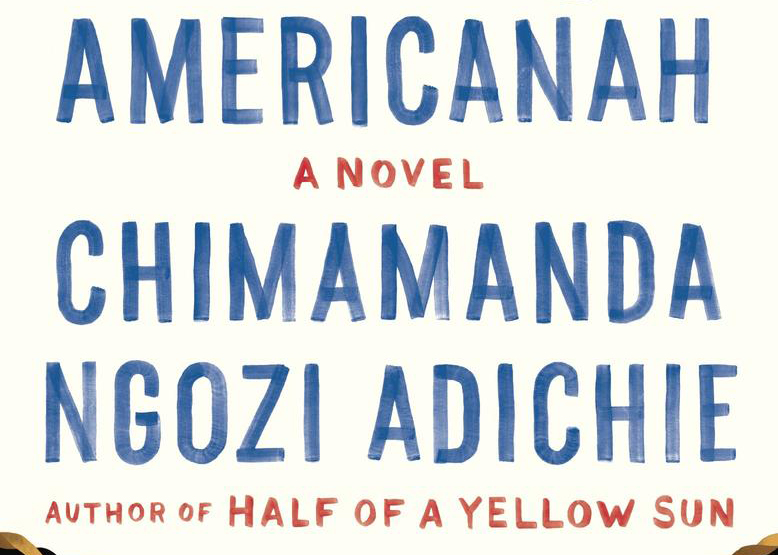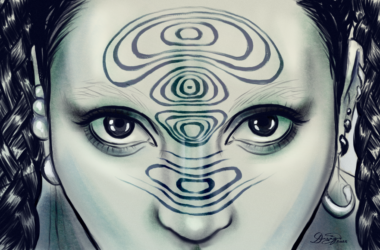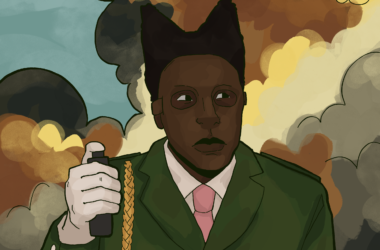In the End It Always Does by The Japanese House – Izzi Holmes
It’s time to give Amber Bain her flowers for In the End It Always Does. The Japanese House’s 2023 album opens with the pop synths of “Touching Yourself” and closes with the melancholic melodies of “One for sorrow, two for Joni Jones,” making Bain’s sophomore work the ideal soundtrack for a sunny winter day. Upbeat yet mellow tracks such as “Sunshine Baby” and “Morning Pages (feat. MUNA)” occupy literal and metaphorical space between these extremes, making for an experience that is both texturally complex and sonically cohesive. Though the British singer-songwriter’s honest lyricism seems bare in print—she repeats the title fourteen times in “You always get what you want”—her rich vocals complement the glittering instrumentals to ensure each repetition is more atmospheric than the last. Whether you feel like dancing or crying until spring rolls around, In the End It Always Does is the perfect companion.
Americanah by Chimamanda Ngozi Adichie – Ava Ellis
Chimamanda Ngozi Adichie’s third novel, Americanah, is more than a love story. Winning the National Book Critics Circle Award for Fiction in 2013, the book captivated readers with its poignant exploration of race, identity, and belonging. Protagonists Ifemelu and Obinze are young lovers faced with disruptive strikes at the University of Nigeria, which force them to emigrate for better opportunities. After moving to America to finish her studies, Ifemelu must confront both her distance from her loved ones and, for the first time, what it means to be Black in the United States. While it is a lengthy love story, Adichie expertly narrates the immigrant experience in the West. Contrasting an undocumented Obinze in London and Ifemelu’s academic success in America, Americanah is an insightful and honest observation of race and how its social effects influence relationships on all levels.
The Idiot by Elif Batuman – Isobel Bray
Step into the world of Selin, a Turkish-American linguistics student at Harvard in the mid-90s, and the novel’s titular “idiot.” Selin’s world is moving from analogue to digital just as she herself is moving from teenagehood to adulthood. It’s easy to relate to her in this liminal space as she navigates friendships and a relationship with her classmate Ivan. The protagonist’s compelling narrative voice is a standout feature, often verging on stream-of-consciousness. Elif Batuman’s prose, stark yet beautiful, captures Selin’s unfiltered dry humor and witty remarks. Selin is an observer, noting absurdities in the world to gain a deeper understanding of herself and where exactly she fits. The novel is a coming-of-age rooted in academia, with Selin providing her thoughts on philosophy, languages, and literature. Selin swings between academic brilliance and social awkwardness, providing entertainment without dampening the story’s emotional resonance.
The Penelopiad by Margaret Atwood – Kellie Elrick
Mentions of sexual violence
When the novella begins, Penelope is dead. She has been for thousands of years. As part of the Canongate Myth Series, Atwood revisits the Odyssey through Penelope’s perspective; Odysseus’s dutiful wife, unfazed by hordes of persistent suitors, patient for her husband’s return, receives a new voice—and she wants to talk about the twelve maids (they appear, too, acting the part of the Chorus). Upon Odysseus’s return, he kills the suitors. But he also hangs the maids whom the suitors slept with, or, more appropriately, whom the suitors raped. Homer compares them to thrushes caught in a snare: Their feet twitch, and then they stop. The simile is beautiful; the scene is horrible. Atwood’s Penelope is all too aware of how slippery language is, reframing both Odysseus’s wiliness (Atwood’s Odysseus is a schmuck) and the orality of Greek epic. Penelope passes her afterlife in the Fields of Asphodel. So do the maids. Their feet still twitch. Homer’s Penelope weaves and unravels a shroud; Atwood’s Penelope weaves a tale, and refuses to let it go.









